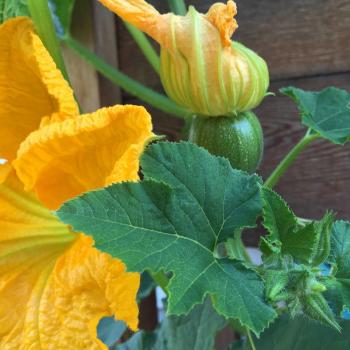Last Saturday, I gathered with a few of my neighbors in the backyard. As often now happens at Garden Club, we gather in one garden initially, but then we migrate from one garden to another, to see one another’s places and sometimes get something only their yard can provide.
We’d trapsed over to one neighbor’s backyard because she promised the rest of us lemons. Seeing as I have a lemon tree that hasn’t yet produced the fruit I so desperately want, I carried a paper bag from my house to hers, eager to fill it up.
And, indeed, she had lemons. And she had fava beans. I took fistfuls of each, eager for the lemonade that would eventually, inevitably get squeezed, eager to try fava beans for the first time.
Then, she took us around the corner, to a shaded part of the yard. She lugged over a stool, placed it under a large leaf, and lifted it up to reveal a huge stem of BANANAS.
Bananas, growing right there in the middle of East Oakland. Bananas, like nothing I’d ever tasted before – a little citrusy, probably the way bananas were intended to taste before mass production took over.

Why, then, am I standing behind a pulpit, talking about bananas on a Sunday morning? Because, this:
“Are not two sparrows sold for a penny?” Jesus asks. “Yet not one of them will fall to the ground apart from your Father. And even the hairs of your head are all counted. So do not be afraid; you are of more value than many sparrows.”
I marvel at my own marveling of bananas …and can’t help but think of God’s marveling in return. Surely, God wonders, God marvels at bananas and sparrows, but how much more God marvels at us – for “even the hairs of your head are all counted. So do not be afraid, [for] you are of more value than many sparrows.”
Jesus spoke these words to his disciples before sending them out, but as you may recall, Jesus spoke similar words to a huge crowd gathered before him.
In the Sermon on the Mount, he says:
Look at the birds of the air: they neither sow nor reap nor gather into barns, and yet your heavenly Father feeds them. Are you not of more value than they? And which of you by being anxious can add a single hour to his span of life?
Could part of our invitation today be to enter into the marvel and the wonder as God sees us, to know and believe and really trust, beyond a shadow of a doubt that we are God’s beloved?
That we, the children of God, are loved and chosen for exactly who we are, as we are?
It’s like God peeks out from between the old hymnal and the wooden pew, whispering directly to us, Beloved, I have counted each and every single one of those hairs on your head – the ones that remain and the ones that keep growing, the ones that you’re losing and the ones you wish you had more of. I know this number because I know YOU: that’s how much you matter to me. So, really, stop your worrying: I got you, for you, my dear, are dearly loved.
Of course, we see hints of this in today’s Old Testament passage and in the psalm as well: In Genesis 21, an Egyptian slave named Hagar is kicked out because of another woman’s jealousies. Some might say Sarah, the jealous woman, the kicker-outer, had every right to be jealous since her husband fathered both boys. Had Jerry Springer (God rest his soul) been around in early 2nd millennium BCE, this chapter would have gotten strong ratings.
Hagar is kicked out of her home, sent away with bread and a “skin of water,” along with her child. She knows she’s been sent to die, so she does the only thing she can do: she shows mercy by placing her child underneath one of the bushes. Maybe someone will find him and care for him. Maybe she will be spared from watching him die.
Whatever her reason, it is here that God begins to speak to her. God calls from heaven and says, “What troubles you, Hagar? Do not be afraid; for God has heard the voice of the boy where he is. Come, lift up the boy and hold him fast with your hand, for I will make a great nation of him.” For her and for her son, God provides and God accompanies; God continues to be with Hagar and with Ishmael as the years go on.
God becomes the one who sees.
Now I don’t know about you, but how might the words God spoke to Hagar also be words God speaks to us? What troubles you, St. Paul’s Episcopal? What troubles you, dear one? … Do not be afraid, for I am the one who hears and sees and knows every hair on your head.
Might this be the case?
I also see this in the Psalm: although I’m normally drawn to the words that declare who God is and what God’s about, when I sat with the passage this last week, I couldn’t help but notice the words the psalmist spoke about himself: I am poor and needy. I am devoted to you. I cry out all day long. I lift up my soul, I call on you. Just as the psalmist shouted truths of God, he shouted honest, vulnerable truths of himself – truths that were real, truths that weren’t always so shiny and polished on the outside.
What then would you shout of yourself?
If I were to write my own psalm, I’d probably say, “Speak kindly to me, for I can be way too sensitive to tone.” “Just because I exude joy, doesn’t mean sadness doesn’t live inside of me.” I don’t know what it would be for you, but for all of us, I know this: we are loved and we are enough, just as we are. For we are God’s beloved, and that’s all that really matters in the end.

In Grace Eventually, one of my favorite writers, Anne Lamott, tells a story that happened in the Sunday school room every Sunday morning. At the end of their time together, she would sit on a couch at the front of the room, while all the wiggling, little preschoolers sat on the floor before her.
“Class, we’re going to play Loved and Chosen,” she’d say. She’d glance around the room slowly, sometimes in a goofy sort of way, and then she’d say, “Is anyone here wearing a blue sweatshirt with Pokemon on it?”
A four-year-old would look down at his chest, astonished to discover that he matched that description. What are the odds? He’d raise his hand and she’d invite him over to sit on the couch beside her. Finally, she’d look him in the eyes. She’d called him by name, and she’d say, “You are loved and chosen.”
Lamott would repeat the exercise over and over again [and I would do the same, choosing and telling stories of two parishioners equally loved and chosen in that moment.]
I don’t doubt it’s the same for us: as much as God loves the bananas of the trees and the birds of the air, how much more God loves you.
For you are loved and chosen, beloved.
Receive the good news today.
—
This is from a sermon preached on June 25, 2023 at St. Paul’s Episcopal Church in San Rafael, California. If you liked this post, you might also like “This Jesus, This Jesus, This Jesus.” In the meantime, remember: you are loved and chosen.

















